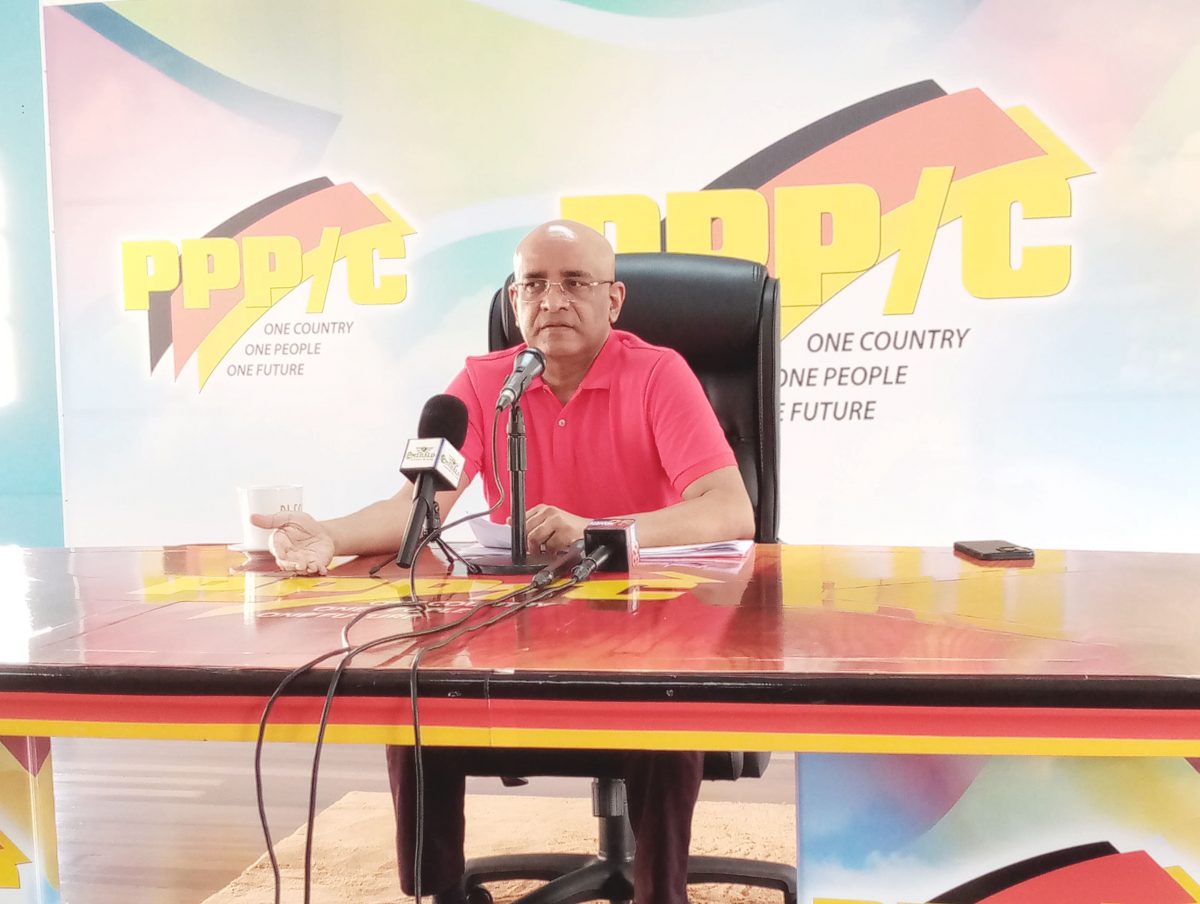Vice President Bharrat Jagdeo during a year-end press conference yesterday said that the government was successful in introducing measures which abated high living costs locally.
His response came following questions posed by a reporter from Guyana Chronicle on how effective the government was in tackling the high costs of living locally, and his views on the series of articles carried by the Stabroek News on the lamentations of citizens on the subject.
Jagdeo made this statement as General Secretary of the People’s Progressive Party Civic (PPP) on Thursday at Freedom House where he held his year-end press briefing. He also said that out of the $781.9 billion fiscal plan for 2023, $5 billion had been allocated towards additional cost of living measures.
The Vice-President noted that as part of the $5 billion cost of living allocation, $850 million was utilised for the acquisition of fertilizer to be distributed to the farmers. This, he explained, was to assist farmers in sustaining their crops and livestock in light of the hardships imposed by the high cost of living.
In addition, in an effort to contain the cost of fuel, zero excise taxes were applied on fuel which will be maintained to absorb the impact of volatile fuel prices. He noted however, that this measure resulted in revenue losses of over $17 billion.
And according to Jagdeo, Guyana is in a better position as it relates to containing the cost of fuel when compared to countries in Europe and North America.
The General Secretary recounted the reduction in freight charges, following an adjustment in costs based on the calculation of import taxes for 12 months at a cost of over $6 billion. He also referenced the government’s increase in Old Age Pension from $28,000 to $33,000 monthly, placing an additional $4.4 billion of disposable income in the hands of 73,000 pensioners.
“We then had direct interventions; we removed the taxes on a whole range of items, on data, on electricity, on water, on food items, a whole range of things – all of value-added taxes.”
He also spoke to the introduction of measures for persons who are building low-income houses, in particular, the steel and cement subsidies, pointing out that through the steel and cement subsidies, citizens building homes to the tune of $6 million and below are eligible to benefit from 80 lengths of ½ inch steel rods, 60 lengths of 3/8 inch steel rods, and one sling of cement. And those with estimates above $6 million and $25 million will benefit from two slings of cement.
In its December 2022 quarterly report, the Inter-American Development Bank (IDB) listed some of the measures taken by Guyana and other Caribbean Governments to stem inflation and assist their economies to grow despite external shocks and higher commodity prices on the world market.
Some of the challenges these countries faced were attributed to the war in Ukraine, resulting in higher oil prices which resulted in higher prices at the pumps.
The Covid-19 pandemic was also another factor highlighted.
“Just as Caribbean economies are emerging from the sharp recessions associated with the COVID-19 pandemic, a confluence of external shocks now complicates the recovery… the current global context of high commodity prices affects countries differently, depending on whether they are mainly commodity importers or exporters”, the IDB stated.
The report detailed that Guyana addressed the increased costs on commodities such as fuel (as a result of higher prices on the world market) by reducing the Excise Tax on fuel from 20 to 10 per cent in January 2022 and then to zero in March of the same year.
According to the IDB, the government absorbed the additional operating costs of electricity and water tariffs.
The Bank also noted that government’s allocation of US$4.8 million for the purchase and distribution of fertiliser to farmers to reduce operating costs, and distributing US$3.8 million in the form of one-time cash grants for households in coastal and riverain communities (US$120 per household).
Leader of the main opposition party People’s National Congress Reform (PNCR), Aubrey Norton, on many occasions, had called on the government to use the monies from the 2023 budget to immediately implement measures to cushion the skyrocketing cost of living.
Just recently, Senior Minister in the Office of the President with responsibility for Finance, Dr Ashni Singh, announced a 6.5 per cent increase across the board for public sector workers along with a one-month, tax-free bonus for the disciplined services with civilian members of the Guyana Defence Force receiving the bonus for the first time.
However, it was noted that the award was once again made without any collective bargaining with the public service union, and understandably, the Opposition was not at all impressed with the announced pay increase for public servants pointing out that it is below the current inflation rate and as such, incapable of relieving the high cost of living.





